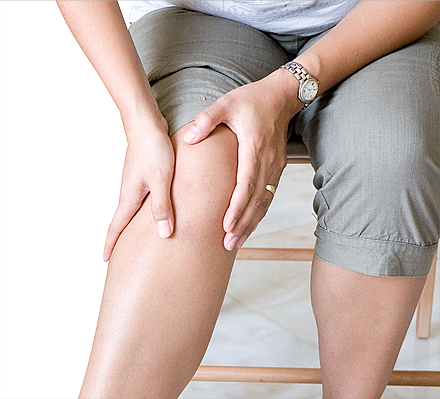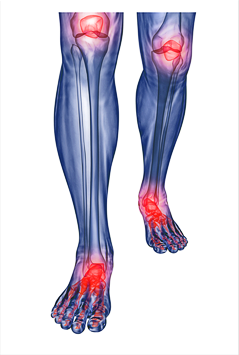Popular Articles
 Achy kneesCauses of achy knees, including how to assess the severity of your achy knees and what can be done to treat/prevent knee aches in the future.
According to research at University of Nottingham, at minimum 1 in 3 people over the age of 40 will experience some type of significant knee pain for at least one month or more, 1 in 4 will find that the knee pain worsens, and nearly 10% of all knee pain subjects will require some type of surgery. Achy knees are a common problem among men and women of all ages, and the older you are, the greater the risk.
|
| Causes of Achy Knees |
|
Osteoarthritis – Osteoarthritis is one of the most common causes of achy knees, believed to affect as many as 37,000,000, to 50,000,000 men and women in the United States alone. Osteoarthritis is also known as "degenerative joint disease," because it causes your joints to become inflamed and damaged over time. Osteoarthritis is caused by a combination of aging, wear and tear, and hormones – although researchers are still trying to locate the direct link between these conditions and achy knees. Osteoarthritis is not deadly or dangerous, but it does increase pain in your joints over time and can be debilitating if left untreated. |
|
Rheumatoid Arthritis – Rheumatoid arthritis is different than osteoarthritis. While osteoarthritis generally effects specific joints and can be managed without medicine, rheumatoid arthritis is an autoimmune disorder that causes your body to essentially attack its own joints as though they are a germ, despite no germ or disease being present. Rheumatoid arthritis generally starts mild, but becomes more severe over time and often affects nearly all moving joints. |
|
Bursitis – Bursitis is a unique condition that may be caused by osteoarthritis, overuse, infection, or injury, but results in more overall knee pain at a faster pace. Bursitis occurs when the fluid filled sacs that surround knee joints and cushion them from injury suffer from inflammation. Most bursitis not caused by any underlying condition will clear up on its own, but the pain itself can be somewhat debilitating while the bursitis occurs. |
|
Gout – Gout is another condition that can affect the knee. Although not generally described as "achy knees," gout occurs when the knee has too much uric acid. Eventually it causes a rush of pain and a burning sensation. It's also likely to be warm to the touch and occur somewhat without warning. |
|
Other Knee Conditions – Besides injury, it's also possible for the knee to develop certain rare cancers. Cancer in the knee is very uncommon, and shouldn't be your first assumption if you have knee aches. That said, if you're experience knee pain at a younger age or you've been to the doctor and your knee pain doesn't appear to be related to aging, it may be a good idea to check for any rare forms of cancer. |
Achy knees are incredibly common, and rarely is it a type of dangerous disorder. However, osteoarthritis – one of the most common conditions affecting knee health – can degenerate your joints further over time, and will require some type of treatment or management to keep your joints healthy and mobile.
Additional Symptoms of Achy Knees
 Achy knees are a symptom, not a disorder. Those that have achy knees can experience a wide range of symptoms based on the type of disorder that created the knee problem. However, achy knees do often come with additional symptoms that you may find problematic. These include:
Achy knees are a symptom, not a disorder. Those that have achy knees can experience a wide range of symptoms based on the type of disorder that created the knee problem. However, achy knees do often come with additional symptoms that you may find problematic. These include:
- Stiff joints.
- Burning sensations.
- Trouble with mobility.
- Pain with movement.
- Visual swelling.
Knees may ache on their own, or with a combination of the above symptoms.
Treatment of Achy Knees
 Treatment of achy knees depends primarily on the type of disorder.
Treatment of achy knees depends primarily on the type of disorder.
For all knee aches that can be explained with mild injury or minor knee discomfort, some basic care may be all that's necessary. Consider ice packs, over the counter pain killers, and keeping off of your achy knees until they heal.
For knee aches that are due to a more serious injury, contact a doctor. Seriously injured knees may require surgery, or could be an infection risk.
Additional treatments depend on the type of disorder. Consider the following:
| Achy Knee Treatments |
|
Osteoarthritis – Osteoarthritis is generally treated with nutritional supplements. Look for supplements that contain glucosamine, chondroitin, and MSM – the three most common ingredients for delivering enough nutrition to the joints in the knee. Proper nutrition is the best way to keep the effects of osteoarthritis under control. |
|
Rheumatoid Arthritis – Rheumatoid arthritis cannot be cured. Supplements used to manage osteoarthritis may be beneficial, but are not necessarily enough. Your doctor may prescribe some type of medication to reduce inflammation and slow the progression of rheumatoid arthritis, including NSAIDS, and steroids. Surgery may be necessary if the disease has progressed beyond achy knees. |
|
Bursitis – Rest and pain medications may be all you need to treat bursitis of the knee. Because bursitis may be caused by osteoarthritis, additional supplementation may be beneficial. If there is an infection, bursitis may require antibiotics. You may also need the fluids of the knee drained if the bursitis has become too problematic. However, rest and care alone may be enough. |
|
Gout – Corticosteroids may be used to stop a gout attack. Over the counter painkillers may also help, but some – like aspirin – can actually increase the pain. Gout can go away temporarily on its own, but you may want to take advantage of available treatments instead, as there are several suitable options for controlling gout and achy knees. Your doctor may also prescribe a medicine that reduces the buildup of uric acid in order to prevent future gout attacks. Diet change may also be enough to control gout. |
|
Other Knee Conditions – When your achy knees are caused by something more serious, it's important to see a doctor. Natural medicine has come a long way towards treating osteoarthritis and related health issues, and for most achy knees rest and relaxation are enough. But in the case of more severe knee conditions like cancer or infection, it's important to visit a doctor and see what they recommend in terms of treatment. |
Because knee pain and achy knees affect millions of people across the United States, many achy knee treatments are available. But each type of treatment requires a correct diagnosis, so make sure you know what is affecting your knees and what is required for treatment to work.
Prevention of Achy Knees
Achy knees can also be prevented, especially in the case of osteoarthritis.
In general, it's important to avoid over-exerting your knees. If they appear to be in pain, give them a rest. Allowing your knees to suffer from inflammation and injury only furthers your risk for achy knees and osteoarthritis.
Building muscles around your legs can also be beneficial. Strong legs reduce many of the pressures on your joints.
For osteoarthritis, it's also important to supply your body with nutrients and supplements known to nourish the joints. Osteoarthritis will get worse if left untreated, but with the right nutrients the joints can stave off further degeneration and ultimately reduce further pain and immobility.





 Common Causes of Achy Knees
Common Causes of Achy Knees